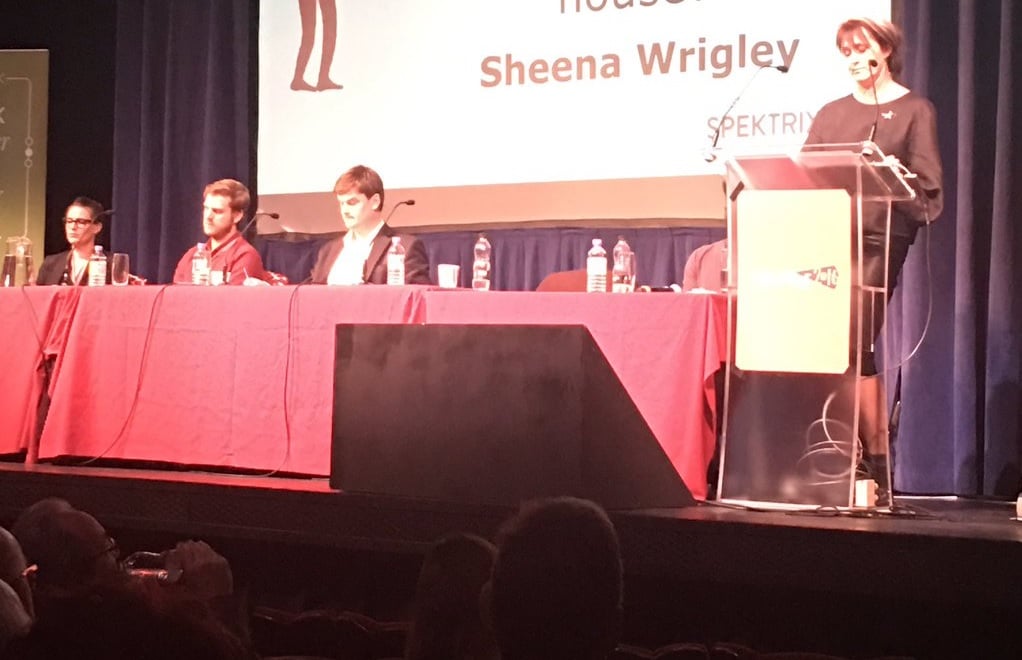
Photo: Marcus Romer
Theatre 2016 conference under fire over inaccessibility
Bon Culture has apologised after physical access issues and high ticket costs prompted anger at its conference last week.
Organisers of the Theatre 2016 conference have apologised following criticism that the event was both physically and financially inaccessible.
A standard ticket to the two-day conference, billed as “the largest ever industry-wide conference for everyone who cares about the future of theatre in the UK” cost £414.
The conference took place last week at the Piccadilly, Lyric and Arts theatres in central London and has raised questions about disabled access facilities in West End theatres.
David Brownlee, Director of conference organiser BON Culture, said: “We apologise and promise that if we were to stage a similar event again we would only do so in venues that are fully accessible.”
Access issues
Head of Creative Programming at the Royal Welsh College of Music and Drama Andrew Miller, who is a wheelchair user, said: “The Theatre 2016 conference marginalised the very people it sought to empower.”
Writing in AP, he explained that the “fundamentally inaccessible” nature of the Piccadilly Theatre meant he had to sit in a box, rather than the stalls, making it difficult to participate in discussions.
“If I had chosen to speak (and believe me I had plenty to say), there was no nearby microphone and the session chair wouldn’t have been able to see me anyway,” he wrote.
He was segregated during lunch and networking events, which took place in inaccessible parts of the theatre.
The central London location of the conference meant he had trouble parking and could only find a space with a four-hour limit. “It was a lot of time, effort and cost for four hours’ conference time,” he wrote. “Almost anywhere else would have been more sympathetic to gather the whole theatre sector.”
David Brownlee responded: “We did allocate staffing to ensure that wheelchair users had access to microphones so they could take part in debates. However we fully accept that some disabled patrons could not take part fully in the networking element of the conference and that the design of the buildings meant that there was a physical divide in some sessions between disabled and non-disabled delegates.”
Andrew Miller used his article in AP to raise the wider issue of accessibility in West End theatres. He described a visit to another theatre where the wheelchair space had limited sightlines and the ‘access lavatory’ was too small to accommodate a wheelchair.
Brownlee said: “Historic theatres around the UK and beyond were not designed with access in mind.”
Financial barriers
Brownlee also apologised to those who felt ‘locked out’ by the price: “We’re really sorry that some people felt excluded by the price of the conference.”
Anger over the cost of tickets erupted on Twitter, with both those prohibited from attending and some conference delegates voicing concern.
I'm sure #theatre2016 is generating great discussion but I just can't shake the frustration of being locked out by the £400 ticket cost
— Luke Emery (@luke_m_emery) May 13, 2016
We would have loved to attend #Theatre2016 but is costs over £400. What a disgrace. pic.twitter.com/yyQhZWdQIE
— Hackney Showroom (@HackneyShowroom) May 12, 2016
Best phrase from #Theatre2016 "send the elevator down" maybe drop in £400 too so they can afford to come next time
— Sarah Brigham (@SarahBrigham) May 13, 2016
The furore prompted theatre critic Andrew Haydon to write a damning article for Exeunt Magazine, in which he said: “What Theatre 2016 has achieved, is giving ‘everyone who cares about the future of theatre’ a glimpse of what that future is going to look like if it’s left in the hands of private consultants and sponsors: ludicrously overpriced prestige events put together entirely to make money for the organisers.”
Haydon’s concerns were echoed by some on Twitter.
Just so we're all clear, #Theatre2016 is run by commercial org Bon Culture. Hence £400 a pop. Not inclusive or representative.
— Shaun Glanville (@remotekey) May 13, 2016
Brownlee described the conference as “extremely complex and expensive,” but said Bon Culture had tried to price it competitively.
“The vast majority of people took advantage of one of the many offers that were distributed through the conferences partners and sponsors,” he said. Members of the conference’s partner organisations and clients of its sponsors were given discount codes that reduced the price of their booking by £100.
Arts Council England (ACE) and Creative Scotland also part funded a number of places to enable a wider range of people to attend, particularly from smaller organisations and independent artists.
In England, 30 places were offered via the conference partners at a cost of £4,750 to ACE. Eligible London-based delegates paid £20+VAT for the subsidised tickets, while those outside London were given free places plus £30 towards expenses.
Bownlee said: “Clearly there is greater demand than we could supply this year, so if we repeat the event we will do all we can to increase the availability of subsidised places.”
He added: “We learnt a huge amount this year that should mean that any future event is even better and more accessible. We’re keen to hear feedback from everyone who came and suggestions from those who couldn’t make it.”
Join the Discussion
You must be logged in to post a comment.